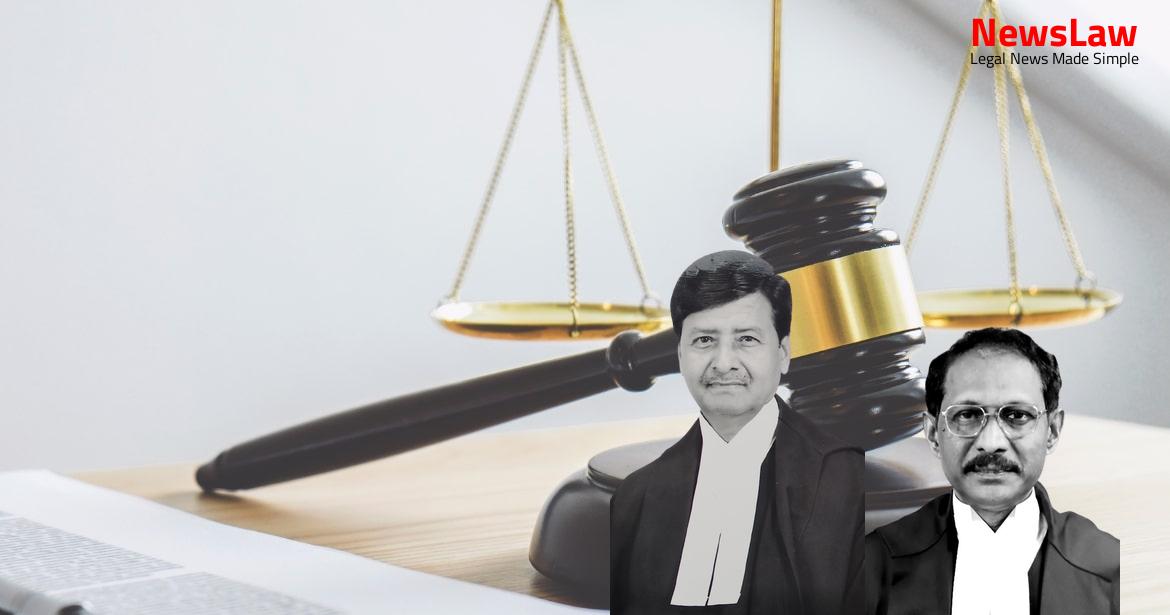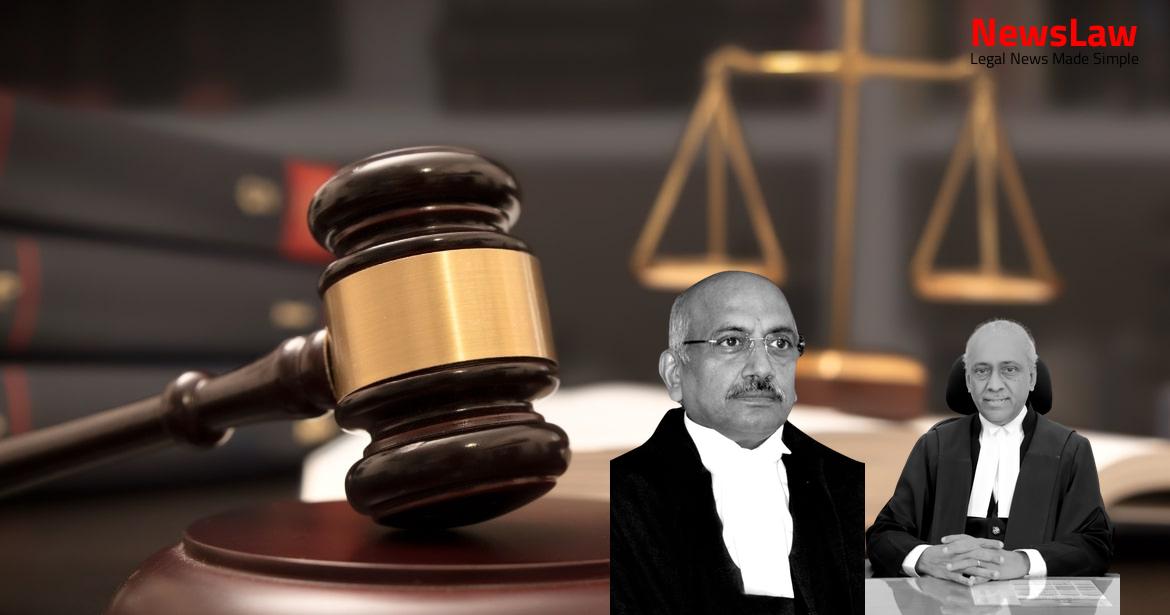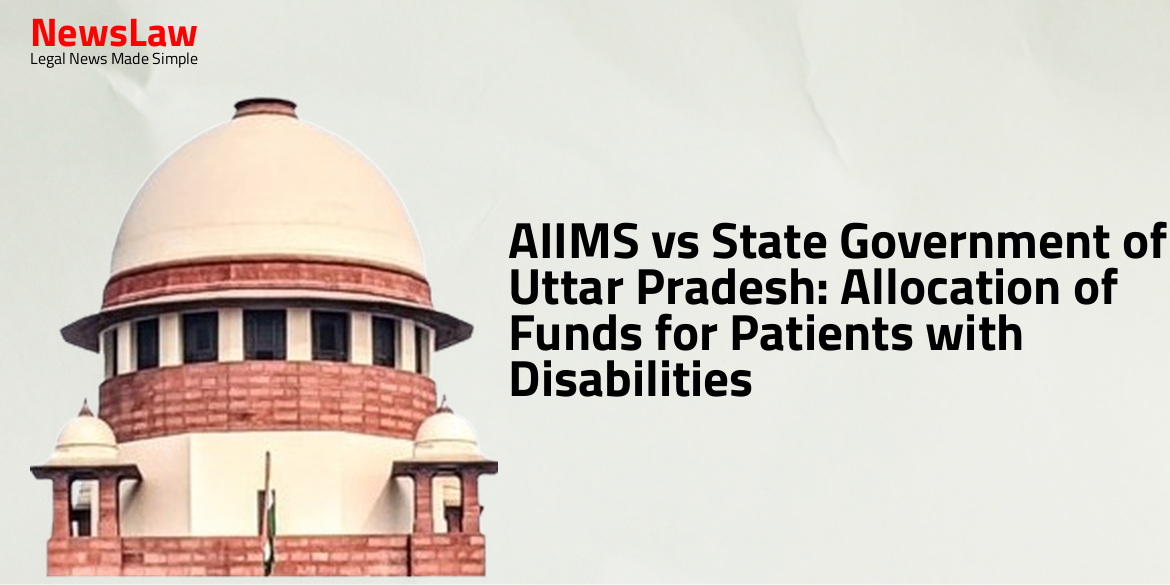The judicial analysis in this case focuses on the court’s discretion in granting specific performance in the context of evolving economic scenarios. The discussion delves into the factors influencing the court’s decision-making process, including equitable considerations and legal standards. Emphasis is placed on the importance of exercising discretion soundly and reasonably, taking into account various aspects such as contractual terms, conduct of parties, and statutory provisions. Stay tuned to unravel the complexities of court’s analysis in specific performance cases.
Facts
- The appellant filed a suit for specific performance on 24.02.1981
- The suit was filed against four defendants, currently represented by the respondents
- The agreement to sell dated 12.06.1980 stated that the vendors had mortgaged the property for a sum of Rs.5,65,000/-
- The vendors were making arrangements to discharge the loan due to Syndicate Bank and obtain a release of their interest in the property
- The appellant company was ready and willing to perform their part of the obligation for completion of the sale transaction
- M/s Venkataraman & Co., the auditor of the defendants, negotiated the sale of the suit property.
- The first defendant received Rs.65,000/- for his son’s marriage out of the advance money paid to the auditor.
- The first defendant was the karta and manager of the joint family.
- The fourth defendant authorized the first defendant to sell the property on his behalf.
- The first defendant’s inconsistent stand during trial was deemed lacking in truth.
- The defendants did not obtain permission from the Urban Land Ceiling authorities, breaching the agreement.
- The defendants’ plea that the sale exceeded the ceiling area was held invalid as there was no clause in the agreement regarding permission from the competent authority.
- The plaintiff was ready and willing to perform its part of the contract by depositing the balance sum in court.
- The sale price was fixed at Rs.1,02,000/- per ground due to the low-lying nature of the land.
- A layout plan for flats had been sanctioned for the suit property.
- Necessity to sell the property was shown due to a loan taken by mortgaging a larger piece of land and money required for the first defendant’s son’s marriage.
Also Read: Legal Analysis on Physical Ability in Rape Case
Issue
- The main issue in this case is whether the plaintiff is entitled to purchase more than 500 sq. metres under the Tamil Nadu Urban Land Ceiling Act.
- Another important issue is whether the suit agreement is void due to the plaintiff’s potential lack of entitlement under the Act.
- Further questions include whether the plaintiff can claim specific performance, the applicability of sub-section 3 of section 5 and the proviso to section 5(3) and section 6, and whether the defendants’ claim under the repealed Act is still valid after its repeal.
Also Read: Analysis of Transfer of Winding Up Proceedings to NCLT
Arguments
- Appellant argued that all factual findings by the Single Judge, including the dishonesty of defendants, were not reversed by the Division Bench in appeal.
- The appellant’s purchase limit of 500 sq. metres did not nullify the agreement but put the risk on the appellant, held by the Single Judge.
- The respondent offered to pay Rs 5 crores to the appellant for the land.
- The appellant’s senior counsel mentioned the readiness to pay Rs. 1.25 Crore for completing the transaction.
- The defendants’ senior counsel proposed to pay Rs. 2 crores as compensation/damages.
- The Division Bench’s judgment was criticized for the long duration of litigation and refusal of specific performance, despite the repeal of the Tamil Nadu Urban Land Ceiling Act.
- The appellant’s entitlement to only 500 sq. metres under the ceiling limit was argued by the respondents to prevent specific performance in the appellant’s favor.
- Assertions were made regarding vested rights accruing at the time of filing the suit and that appellate judgment should not affect those rights.
- The appellant was awarded Rs. 2 crores by the Division Bench and the argument was made against interference by this Court under Article 136.
- Citations were provided to contest the Division Bench’s interpretation of section 5(3) of the Tamil Nadu Urban Land Ceiling Act.
- The argument emphasized the appellant’s readiness to perform and the defendants’ breach, showing no reversal of these findings by the Division Bench.
- The Full Bench judgment stands as a roadblock to the decreeing of a suit for specific performance in the present case according to Shri Giri.
- The plaintiff may potentially earn more profit than the offered Rs. 2 crores if permitted to purchase the property.
- The agreement in question is specifically for the sale of land post exemption from appropriate authorities.
- The Full Bench judgment being inter-parties must apply to the parties, with res judicata attaching even to issues of law based on the same cause of action.
- The appellant’s plea of escalation in price cannot be accepted as they do not have the right to question the agreement of sale made by the absolute owner of the properties involved.
Also Read: Judicial Discretion in Contractual Interpretation
Analysis
- Section 20 of the Specific Relief Act, 1963, prior to its substitution by the Specific Relief (Amendment) Act, 2018, dealt with the discretion of the court in decreeing specific performance.
- The jurisdiction to decree specific performance was discretionary, and the court was not bound to grant such relief solely because it was lawful to do so.
- The court’s discretion in granting specific performance was emphasized.
- A specific case involving the sale transaction of property subject to the Urban Land Ceiling Act was discussed.
- The agreement between the vendor and purchaser included provisions related to loan discharge, necessary certificates and permissions under the Urban Land Ceiling Act, and completion timeline for the transaction.
- Section 4 of the Act mentioned the restrictions on holding vacant land exceeding the ceiling limit.
- The judgment discusses at length the discretion of the court in decreeing specific performance, emphasizing that mere filing within the limitation period does not mandate automatic decree.
- Reference is made to the discretion granted under Section 20(1) of the Specific Relief Act, highlighting the importance of exercising this discretion soundly and reasonably.
- The discussion delves into the circumstances that justify the court’s discretion in not decreeing specific performance, such as terms of the contract, conduct of parties, and the impact of ongoing laws.
- The judicial interpretation of various clauses under Section 20, including the consideration of hardship, unfair advantage, and equities between parties, is scrutinized.
- The impact of inflation and increased property prices on the specific performance cases post-1975 is evaluated, noting the need for flexibility in principles due to changing economic conditions.
- The notion that time is not always the essence in contracts related to immovable properties is examined, with considerations of delays, latches, and the importance of contractual time-limits.
- The court’s analysis involves a comparison of past laws and precedents with the evolving economic scenarios post-inflation era, emphasizing the need for updated perspectives in specific performance cases.
- The implications of the Tamil Nadu Urban Land Ceiling Act on specific performance cases, particularly in terms of completed transactions, pending suits, and potential violation of statutory provisions, are closely reviewed.
- The judgment concludes with a critical look at the challenges faced by the court in balancing judicial discretion, equitable relief, and evolving legal standards in the context of specific performance suits.
- Existing rights and pending litigation may be affected by repealing clauses.
- The saving clause may be used to preserve existing rights and exempt pending litigation.
- Repealing clauses that refer to specific portions of prior acts may not repeal the entire act unless there is irreconcilable inconsistency.
- Section 6 of the GC Act enumerates the effects of repealing any enactment.
- Grant of decree of specific performance is at the discretion of the court.
- The court can impose reasonable conditions while granting or refusing decree of specific performance.
- The three-year period in special cases can assist purchasers if equity shifts in their favor.
- The value of property in urban areas has considerably increased over the years.
- The grant of decree for specific performance is subject to various conditions and circumstances of the case.
- New laws should be prospective, not retrospective in their operation.
- The court may consider supervening facts with fundamental impact even in appeal.
- Amendment to avoid multiplicity of litigation may be permitted if no prejudice is caused.
- Additional compensation may be awarded in specific cases due to changed circumstances.
- Time may not be of the essence in contracts related to immovable properties in stable price eras.
- Legal fiction creates a presumption of existence where it actually doesn’t.
- The court may consider subsequent events in equitable jurisdiction to mold reliefs.
- The court may vary the relief based on the updated facts and development.
- Repeal of an act wipes it off completely unless for transactions past and closed.
- Appeals are considered a continuation of suits under the law in force at the date of the suit.
- Courts exercise discretion in specific performance suits based on numerous factors.
- Multiple judgments have outlined principles related to specific performance.
- Equity considerations play a significant role in granting or withholding specific performance reliefs.
- The courts carefully consider the conduct of the parties and balance of equities in specific performance cases.
- Defendants in the case were found to have taken up dishonest pleas and breached a solemn agreement.
- Appellant was ready and willing to perform its part of the bargain throughout.
- Division Bench judgment should be set aside in this case.
- It is within the court’s discretion to decide if additional amounts should be paid by the plaintiff post a decree of specific performance.
- Shri Giri’s appeal to not exercise discretionary jurisdiction under Article 136 was rejected.
- Equity must be done by the party seeking equity.
- Judgments in Jacques v. Withy, 1 H. Bl. 65, Hitchcock v. Way, (1837) 6 A & E 943 : 112 ER 360, and Ram Kristo Mandal v. Dhankisto Mandal, (1969) 1 SCR 342 (at p. 349) cited by Shri Giri do not apply to the case.
- These judgments do not support the proposition that the repeal of a statute revives a void agreement.
- In the present case, the cited judgments lack relevance and are not applicable.
Decision
- The judgment and decree of the learned single Judge is modified to direct the defendants/appellants to pay a sum of Rs.2 crores to the plaintiff instead of specific performance of the agreement.
- The plaintiff is permitted to withdraw the amount deposited along with accrued interest.
- The defendants are directed to pay the plaintiff Rs.2 crores as compensation/damages within eight weeks.
- The property is confirmed to be subject to a mortgage loan and the vendors must discharge the loan before the sale deed execution.
- The suit property admeasured 8 grounds and 2354 sq. feet.
- The defendants did not obtain necessary permissions, including from the Tamil Nadu Urban Land Ceiling Act.
- The appeal is allowed in part, and the respondent must pay Rs.5 crores to the appellant within three months.
- Failure to pay by the specified date will incur interest at the rate of 10% per annum.
- The Civil Appeal is allowed with no order as to costs.
Case Title: FERRODOUS ESTATES (PVT) LTD. Vs. P.GOPIRATHNAM (DEAD) AND ORS. (2020 INSC 586)
Case Number: C.A. No.-013516-013516 / 2015



